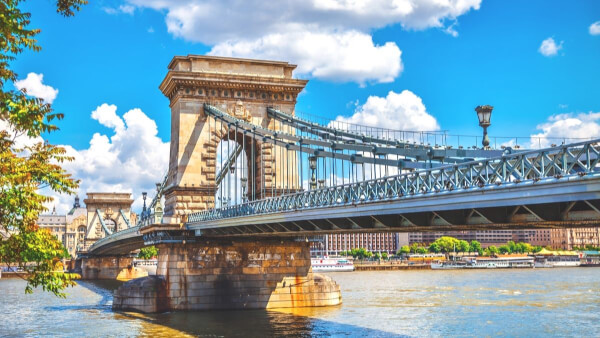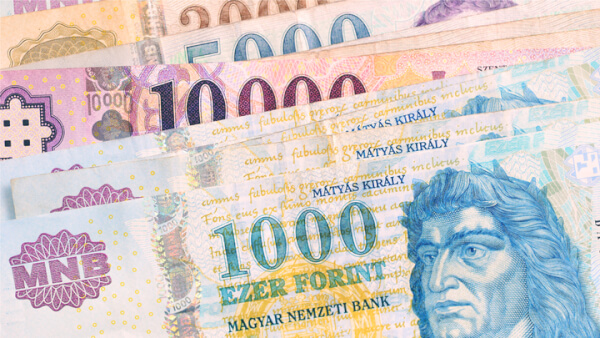Hungary digital nomad visa: Complete guide for UK expats
Read our complete guide to the Hungary digital nomad visa, covering fees, documents, eligibility requirements and application process.

Planning a trip to Hungary from the UK? Whether you’re heading off on a city break, work trip or a longer stay, you’ll need to know how to get your hands on some Hungarian forints (HUF).
If you like to have some cash on you, read on for all the info you need about ATMs in Hungary.
In this handy guide, we’ll run through where to find cash machines in Hungary, plus info on fees, currency conversion, PIN numbers and which cards are accepted.
We’ll even show you a super convenient way to spend abroad using the Wise card, which works in 150+ countries.
ATM’s are widely available in Hungary and can usually be found in airports, bus and train stations, shopping centres and outside banks.
If you are in a city or large town, you are likely not far from an ATM. In smaller towns though, they may take a little more effort to find.
To find your nearest ATM, try these locator tools from major international and Hungarian banks:
ATMs are generally called ATMs in Hungary, although you might also see them labelled with ‘Bankomat’.¹
Some may just have the name of the bank, but they should look similar to the cash machines you’ll find back in the UK.
As a UK traveller, you should be fine to use your card at Hungarian ATMs. They generally accept Visa and Mastercard debit and credit cards,² which are the most commonly issued types of cards in the UK.
Most should also accept international cards, as well as those linked to Hungarian bank accounts.²
Before withdrawing cash though, it’s important to check whether your bank at home has any charges for overseas ATM withdrawals.
You can search for your nearest cash machine in Hungary with these global ATM locators from Visa and Mastercard:
ATMs in Hungary generally accept the 4-digit PINs we use here in the UK.¹
When it comes to paying for things with your card, Chip & PIN is widely used in Hungary. In big cities like Budapest, contactless cards and mobile wallets may also be accepted. But in some places, you may still encounter older magnetic stripe systems (where your card needs to be swiped).
Many debit cards have both, but it’s a good idea to check before you travel.
The maximum amount you can withdraw from an ATM (whether in the UK or overseas) will largely depend on your home bank and its limits.
But the ATM itself may also impose cash withdrawal limits.
In Hungary, you should be able to withdraw up to 100,000 HUF (around £202 GBP) per transaction.²
These days, it isn’t strictly necessary to inform your bank you’ll be using your debit card abroad.
But it could be a good idea to do it anyway, just in case any of your Hungarian transactions are mistakenly flagged up as suspicious. This could result in failed payments or in the worst case scenario, a blocked card.
To avoid any of this hassle, it could even be worth getting an alternative spending card - one that is specially designed for international travel.
A great option is the Wise card, as it works in 150+ countries and lets you withdraw up to £200 a month (max. 2 withdrawals) from overseas ATMs without any fees*. Wise doesn’t charge for these withdrawals but you’ll need to check that the ATM operator doesn’t charge its own fees.
Choose to withdraw in the local currency and your Wise card will do the currency conversion at the mid-market exchange rate with only a small conversion fee*.
This means no expensive mark-ups eating into your spending money.
Now we come to the important question - how much will it cost you to withdraw cash in Hungary?
Read on for info on potential costs, including ATM access fees and currency conversion costs.
The first key thing to get to grips with when taking cash out abroad is currency conversion.
If you’ve ever used an ATM in another country, you’ll be familiar with the screen asking you if you want the transaction to be carried out in British pounds or the local currency. In this case, the local currency would be Hungarian forints (HUF).
It’s always recommended to choose to withdraw in the local currency, and decline the currency conversion.
This should mean you get a better exchange rate. This is because the conversion will be done by your bank or card provider, rather than the ATM - which wou;d use something called Dynamic Currency Conversion (DCC) to choose its own exchange rate.
When DCC is involved, it usually means an unfavourable rate and a more expensive transaction for you. So, it’s best avoided.
The bottom line is - always choose the local currency when withdrawing cash at an overseas ATM.
Before using an ATM abroad, you need to check whether your bank back in the UK charges foreign transaction fees. Known as ‘non-Sterling transaction fees’, these often apply to spending and/or cash withdrawals outside the UK.
So to avoid any surprise charges, get in touch with your bank before you travel. Alternatively, you can take a look at the fee information document for your UK bank account.
The good news is that most bank-owned ATMs in Hungary don’t tend to charge access fees.¹
However, there may be exceptions - and other providers like Euronet may still charge fees. So, check the ATM screen and see if there are any fees before confirming the withdrawal.
Yes, it should be possible to get free cash withdrawals in Hungary. Opt for a bank-owned ATM - if there’s a fee, it’ll be displayed on the screen before you confirm the transaction.
Just make sure you decline the option for currency conversion.
When you use a UK-issued card in a foreign ATM, you may be offered the ‘service’ of being charged in your local currency (i.e. GBP). While this may seem the easiest option, it’s always best to decline this.
Being charged in the local currency helps you avoid hidden ATM rip-offs by giving you the best possible exchange rate.
This is because if you choose the local currency (in this case, HUF), your bank or card provider will do the currency conversion and apply the exchange rate.
But if you choose to have the transaction charged in GBP, this gives the ATM permission to give you an arbitrary (generally much more unfavourable) exchange rate for your withdrawal. So, it’s best avoided.
Check out the latest GBP to HUF conversion rates below:
ATMs at airports tend to be very expensive, often charging high fees for withdrawing money or converting currency.
So even though it might seem the most convenient option to withdraw cash the moment you land in Hungary, it could be most cost-effective to wait until you reach a city centre.
If your UK bank has an overseas ATM network or partners with banks in Hungary, you may be able to benefit from low or no fees on ATM withdrawals. It’s always worth finding out before you travel.
Many UK banks now offer fee-free spending and cash withdrawals overseas (although of course, you do need to watch out for ATM access fees).
So if your bank doesn’t offer this, it could be time to switch to a new one.
Another crucial thing to remember is that unless it’s unavoidable, you should never withdraw cash using a credit card.
It’s usually much more expensive than using a debit card, as fees are charged for cash-based transactions. Plus, interest will likely start accruing right away, so you won’t benefit from your usual interest-free period.
Love to travel? If you regularly spend time between countries, the Wise card could be your perfect travel companion.
It’s a dedicated contactless travel card, letting you spend like a local in 150+ countries worldwide. It automatically converts your pounds to the local currency at the mid-market exchange rate whenever you spend.
And when you need cash, you can use it to withdraw up to £200 a month (max. 2 withdrawals) fee-free. You’ll just need to check whether the ATM operator charges its own fees.
Wise only ever charges small, transparent fees* for currency conversion, and it’s fee-free if you already have the currency in your Wise account.
Sign up for a Wise account online and you can get your own Wise card for a one-time fee of just £7.
Debit cards are widely accepted in Hungary, especially in larger towns and cities. But you may still need cash in smaller shops and street vendors, for tipping, some public transport and if visiting remote locations.
Yes, you should be fine to use your UK debit card in Hungary, as both Visa and Mastercard are accepted.
Contactless payments are becoming increasingly common in Hungary, especially in major cities like Budapest.
Tipping is common and appreciated in Hungary, but it’s not mandatory. You might want to leave a tip in cafes, bars and restaurants, along with in hotels, spas/salons and when using delivery services.
Cards, contactless and digital payments are becoming increasingly popular in Hungary, but cash is still one of the most popular methods for in-store payments.³
Sources used:
Sources last checked on date: 27-Nov-2024
*Please see terms of use and product availability for your region or visit Wise fees and pricing for the most up to date pricing and fee information.
This publication is provided for general information purposes and does not constitute legal, tax or other professional advice from Wise Payments Limited or its subsidiaries and its affiliates, and it is not intended as a substitute for obtaining advice from a financial advisor or any other professional.
We make no representations, warranties or guarantees, whether expressed or implied, that the content in the publication is accurate, complete or up to date.

Read our complete guide to the Hungary digital nomad visa, covering fees, documents, eligibility requirements and application process.

Should you pay with cash or card in Budapest? A handy guide including cash etiquette, Hungarian ATMs and using your UK card.

This article gets you one step closer to your affordable vacation in Hungary by detailing your options for VAT refund in Hungary as a tourist.

Travelling to Budapest: Find out how to spend and get around while you’re there.

Budapest is fast becoming a popular city to visit. Tourism to Hungary has been increasing in past years, and it’s easy to see why the city is growing in...

If you plan to live, work, or invest in Hungary, or if you’re just going to visit, you’ll want to know the basics on spending. In this financial guide to...